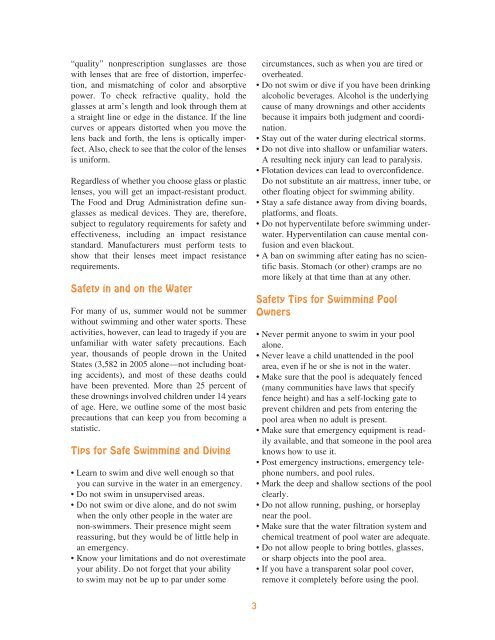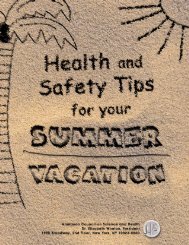Health and Safety Tips for Your Summer Vacation (Update 2010)
Health and Safety Tips for Your Summer Vacation (Update 2010)
Health and Safety Tips for Your Summer Vacation (Update 2010)
Create successful ePaper yourself
Turn your PDF publications into a flip-book with our unique Google optimized e-Paper software.
“quality” nonprescription sunglasses are those<br />
with lenses that are free of distortion, imperfection,<br />
<strong>and</strong> mismatching of color <strong>and</strong> absorptive<br />
power. To check refractive quality, hold the<br />
glasses at arm’s length <strong>and</strong> look through them at<br />
a straight line or edge in the distance. If the line<br />
curves or appears distorted when you move the<br />
lens back <strong>and</strong> <strong>for</strong>th, the lens is optically imperfect.<br />
Also, check to see that the color of the lenses<br />
is uni<strong>for</strong>m.<br />
Regardless of whether you choose glass or plastic<br />
lenses, you will get an impact-resistant product.<br />
The Food <strong>and</strong> Drug Administration define sunglasses<br />
as medical devices. They are, there<strong>for</strong>e,<br />
subject to regulatory requirements <strong>for</strong> safety <strong>and</strong><br />
effectiveness, including an impact resistance<br />
st<strong>and</strong>ard. Manufacturers must per<strong>for</strong>m tests to<br />
show that their lenses meet impact resistance<br />
requirements.<br />
<strong>Safety</strong> in <strong>and</strong> on the Water<br />
For many of us, summer would not be summer<br />
without swimming <strong>and</strong> other water sports. These<br />
activities, however, can lead to tragedy if you are<br />
unfamiliar with water safety precautions. Each<br />
year, thous<strong>and</strong>s of people drown in the United<br />
States (3,582 in 2005 alone—not including boating<br />
accidents), <strong>and</strong> most of these deaths could<br />
have been prevented. More than 25 percent of<br />
these drownings involved children under 14 years<br />
of age. Here, we outline some of the most basic<br />
precautions that can keep you from becoming a<br />
statistic.<br />
<strong>Tips</strong> <strong>for</strong> Safe Swimming <strong>and</strong> Diving<br />
• Learn to swim <strong>and</strong> dive well enough so that<br />
you can survive in the water in an emergency.<br />
• Do not swim in unsupervised areas.<br />
• Do not swim or dive alone, <strong>and</strong> do not swim<br />
when the only other people in the water are<br />
non-swimmers. Their presence might seem<br />
reassuring, but they would be of little help in<br />
an emergency.<br />
• Know your limitations <strong>and</strong> do not overestimate<br />
your ability. Do not <strong>for</strong>get that your ability<br />
to swim may not be up to par under some<br />
circumstances, such as when you are tired or<br />
overheated.<br />
• Do not swim or dive if you have been drinking<br />
alcoholic beverages. Alcohol is the underlying<br />
cause of many drownings <strong>and</strong> other accidents<br />
because it impairs both judgment <strong>and</strong> coordination.<br />
• Stay out of the water during electrical storms.<br />
• Do not dive into shallow or unfamiliar waters.<br />
A resulting neck injury can lead to paralysis.<br />
• Flotation devices can lead to overconfidence.<br />
Do not substitute an air mattress, inner tube, or<br />
other floating object <strong>for</strong> swimming ability.<br />
• Stay a safe distance away from diving boards,<br />
plat<strong>for</strong>ms, <strong>and</strong> floats.<br />
• Do not hyperventilate be<strong>for</strong>e swimming underwater.<br />
Hyperventilation can cause mental confusion<br />
<strong>and</strong> even blackout.<br />
• A ban on swimming after eating has no scientific<br />
basis. Stomach (or other) cramps are no<br />
more likely at that time than at any other.<br />
<strong>Safety</strong> <strong>Tips</strong> <strong>for</strong> Swimming Pool<br />
Owners<br />
• Never permit anyone to swim in your pool<br />
alone.<br />
• Never leave a child unattended in the pool<br />
area, even if he or she is not in the water.<br />
• Make sure that the pool is adequately fenced<br />
(many communities have laws that specify<br />
fence height) <strong>and</strong> has a self-locking gate to<br />
prevent children <strong>and</strong> pets from entering the<br />
pool area when no adult is present.<br />
• Make sure that emergency equipment is readily<br />
available, <strong>and</strong> that someone in the pool area<br />
knows how to use it.<br />
• Post emergency instructions, emergency telephone<br />
numbers, <strong>and</strong> pool rules.<br />
• Mark the deep <strong>and</strong> shallow sections of the pool<br />
clearly.<br />
• Do not allow running, pushing, or horseplay<br />
near the pool.<br />
• Make sure that the water filtration system <strong>and</strong><br />
chemical treatment of pool water are adequate.<br />
• Do not allow people to bring bottles, glasses,<br />
or sharp objects into the pool area.<br />
• If you have a transparent solar pool cover,<br />
remove it completely be<strong>for</strong>e using the pool.<br />
3










